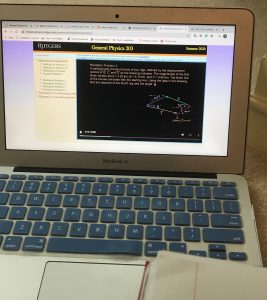The Georgetown Student Health Center, Health Education Services (HES), and Counseling and Psychiatric Services (CAPS), are offering limited in-person and virtual services to students during the Covid-19 pandemic.
These services are continuing to serve the approximately 200 undergraduate and 110 law students approved to remain on-campus after the university’s decision to transition to virtual classes on March 16.
While on-campus physical and mental health resources remain available, the student-run Georgetown Emergency Response Medical Service (GERMS) has suspended its services for the rest of the semester. GERMS is asking on-campus students with medical licenses to refrain from providing medical care and to refer fellow students to university resources.
“There are a lot of students on-campus who do have EMT licences, but this acts as a certification, not a license to practice,” GERMS Captain Julia Friberg (NHS ’21) said. “For this reason, we are encouraging students to call 911 or contact Student Health in an emergency.”
“It could be dangerous for the students themselves and put them in a lot of risk if they are doing things that are outside of their training,” Friberg added.
Students who wish to visit the Student Health Center are asked to first contact a medical professional through the MedStar Portal or by phone before visiting the center in-person. If a medical professional believes a student needs further care or testing, students can make an appointment at the center. According to the Student Health Center website, the center can consult with all students virtually and direct them to medical care regardless of their location.
Unlike the Student Health Center, HES and CAPS have both transitioned to a solely virtual environment. According to Director of Health Education Carol Day, HES clinical professionals are offering free tele-appointments to students on and off campus.
CAPS is also eliminating any fees for students who utilize their virtual appointments. CAPS clinicians are licensed in D.C. and usually a few other states. Students outside of D.C. can receive tele-therapy and tele-psychiatry services from CAPS professionals as long as their state licensing boards approve it. As a result of the pandemic, many U.S. states are allowing CAPS professionals to continue appointments as long as they are licensed in D.C.
CAPS Director Phil Meilman emphasized that mental health resources remain available as many students are experiencing challenging transitions. “Students had to deal with the news about their school year and all the attendant losses such as senior spring, graduation, the truncated end of some students’ first year; then they had to relocate on short notice,” Meilman wrote in a statement to the Voice.
Although virtual therapy settings are not ideal, Meilman encouraged students to seek help on CAPS’s secure virtual platforms if they need it. “The consultations will offer you the ability to ask questions, get connected to needed resources, provide guidance about next steps during these difficult times, and thus begin the helping process,” he wrote.
Georgetown mental health resources:
Health Education Services (HES): (202) 687-8949; sarp@georgetown.edu
Student Health Center: (202) 687-2200; or message through the MedStar portal
Counseling and Psychiatric Services (CAPS): (202) 687-6985; after hours, call (833) 960-3006 to reach Fonemed, a telehealth service; individuals may ask for the on-call CAPS clinician





